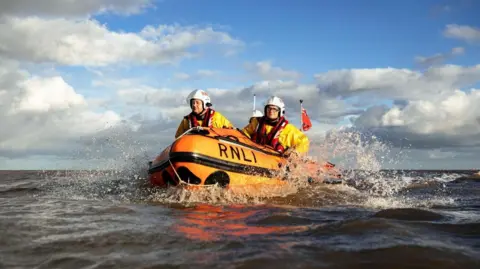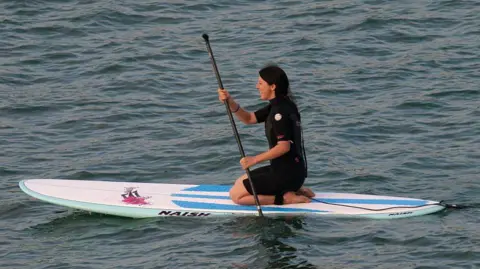RNLI warning as warm spell sees rise in call-outs
 RNLI
RNLILifeboat crews have urged people to enjoy the seaside safely after a number of incidents during the recent spell of hot weather.
Cleethorpes RNLI said crews had been called out 37 times this year – about a third more than they would usually expect at this point of the summer.
Matt McNally, from the charity, said it had been "noticeably busier" over the past month or so.
A large proportion of the incidents involved people being cut off by the incoming tide, or kayakers and paddleboarders needing to be rescued due to offshore winds.
In one incident on Monday, five people had to be rescued by a Coastguard helicopter having misjudged the tide on the sands off Cleethorpes.
Mr McNally said people getting cut off was "always a thing" in the resort, but added: "It just seems to be more so this year – people in the wrong place at the wrong time."
"We have also seen an increase in inflatable paddleboards and kayaks - which although more seaworthy than an inflatable unicorn can be very badly affected by an offshore wind.
"We've had a couple of recent incidents where we've had to help people who were unable to make their own way back to shore," he added.
 Getty Images
Getty ImagesMeanwhile, Sue Hickson-Marsay, from Hornsea Inshore Rescue, in East Yorkshire, said they had dealt with a number of potentially serious incidents during the recent hot spell, including the rescue of two dogs, as well as a call involving an overturned kayak.
"The two men were suffering from hypothermia and were very pleased to see us," she said.
Dale Chapman, operations manager for Mablethorpe RNLI Lifeboat, said the station had also been extremely busy.
"On average the Mablethorpe Lifeboat is called out between 20 and 25 times in a year. This year, it's been out 13 times already, which is higher than we'd normally expect, and that's before our busiest period, the school holidays, has even started."
Listen to highlights from Lincolnshire on BBC Sounds, watch the latest episode of Look North or tell us about a story you think we should be covering here.
